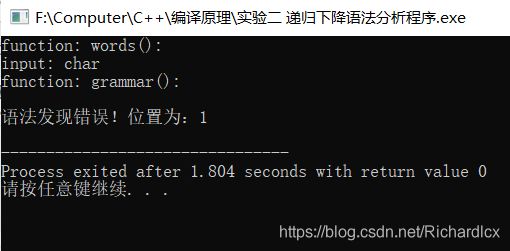实验二:递归下降语法分析
文章目录
- 一、实验目的
- 二、实验原理与要求
-
- 1、原理
- 2、要求
- 三、实验设备
- 四、实验内容
- 五、实验步骤
-
- 1. 单词内码表
- 2. 定义语言文法
- 3. 语法分析器的实现(编码)
- 4. 测试
- 六、配套资源
一、实验目的
理解自顶向下语法分析的基本模式,熟悉递归下降分析程序的构造。
二、实验原理与要求
1、原理
每个非终结符抽象为一个函数,语法树的上下级关系对应于函数的递归调用。
2、要求
(1)针对一个具体语言子集,设计出相应的文法。
(2)递归过程按规定的模式。
(3)测试用例覆盖每个产生式候选。
三、实验设备
配置有C/C++开发环境的计算机设备。
四、实验内容
采用递归下降分析法对变量定义语句、赋值语句、while语句、if语句进行语法分析。对每个非终结符设计递归子函数。
五、实验步骤
1. 单词内码表
在实验一 词法分析程序的设计的基础上,要求考虑while语句、if语句。以下为一参考实现:
![]()
2. 定义语言文法
选取高级语言的部分语句,先定义其中所涉及的非终结符:

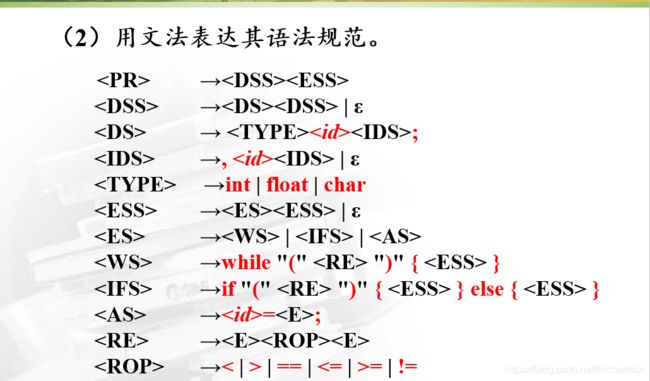
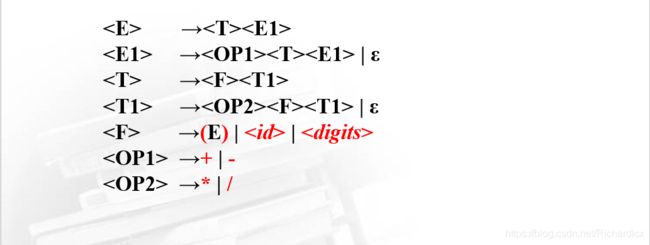
说明:
(1)把识别出来的单词均作为终结符对待。
(2)在本实验中用单词种类编号表示单词,所以和当前输入符号比较的时候比较的是单词种类编号。例如:
if(str[ip]==’(‘) 改成 if(str[ip]==19)
else if(str[ip]==’a’) 改成 else if(str[ip]==100)
3. 语法分析器的实现(编码)
// -*- coding: utf-8 -*-
// @ Date : 2020/5/20 13:14
// @ Author : RichardLau_Cx
// @ file : Richard.cpp
// @ IDE : Dex-C++
// @ Source : 编译原理实验
#include ->
DSS();
ESS();
}
void DSS()
{ // -> | ε
if (lookAhead == 4 || lookAhead == 5 || lookAhead == 6)
{
/** lookAhead属于FIRST()
* FIRST() = {int, float, char} = {4, 5, 6}
* 求出FIRST集经过计算之后,才能用代码表示
*/ -> | ε
if (lookAhead == 3 || lookAhead == 1 || lookAhead == 100)
{
/** lookAhead属于FIRST()
* FIRST() = {while, if, } = {3, 1, 100}
*/ -> ;
TYPE();
if (lookAhead == 100)
{
match();
IDS();
if (lookAhead == 18)
{ // ";"的种别编码为18
match();
}
else {
error2();
}
}
else {
error2();
}
}
void TYPE()
{ // -> int | float | char
cout << "lookAhead: " << lookAhead << endl;
if (lookAhead == 4)
{ // 匹配到int
// printf("\n匹配到int!\n");
match();
}
else if (lookAhead == 5)
{ // 匹配到float
match();
}
else if (lookAhead == 6)
{ // 匹配到char
match();
}
else
{
error2(); // 语法错误
}
}
void IDS()
{ // -> , | ε
if (lookAhead == 17)
{ // ","的种别编码为17
match();
if (lookAhead == 100)
{
match();
IDS();
}
}
// 因为有ε,所以不用写else error();
}
void ES()
{
// -> | |
/**
* FIRST() = {while} = {3},
* FIRST() = {if} = {1},
* FIRSR() = {} = {100}
*/
if (lookAhead == 3)
{
// match();
WS();
}
else if (lookAhead == 1)
{
// match();
IFS();
}
else if (lookAhead == 100)
{
// match();
AS();
}
else
{
error2();
}
}
void WS()
{ // -> while "(" ")" {}
// 因为皆为递进关系,所以需要嵌套着写
if (lookAhead == 3)
{ // 读出while
match();
if (lookAhead == 19)
{ // 读出"("
match();
RE();
if (lookAhead == 20)
{ // 读出")"
match();
if (lookAhead == 23)
{ // 读出"{"
match();
ESS();
if (lookAhead == 24)
{ // 读出"}"
match();
}
else
{
error2();
}
}
else
{
error2();
}
}
else
{
error2();
}
}
else
{
error2();
}
}
else
{
error2();
}
}
void IFS()
{ // if "(" ")" { } else { }
if (lookAhead == 1)
{ // 读出if
match();
if (lookAhead == 19)
{ // 读出"("
match();
RE();
if (lookAhead == 20)
{ // 读出")"
match();
if (lookAhead == 23)
{ // 读出"{"
match();
ESS();
if (lookAhead == 24)
{ // 读出"}"
match();
if (lookAhead == 2)
{ // 读出else
match();
if (lookAhead == 23)
{ // 读出"{"
match();
ESS();
if (lookAhead == 24)
{ // 读出"}"
match();
}
else
{
error2();
}
}
else
{
error2();
}
}
else
{
error2();
}
}
else
{
error2();
}
}
else
{
error2();
}
}
else
{
error2();
}
}
else
{
error2();
}
}
else
{
error2();
}
}
void AS()
{ // -> =;
if (lookAhead == 100)
{
match();
if (lookAhead == 13)
{ // 读出"="
match();
E();
if (lookAhead == 18)
{ // ";"的种别编码为18
match();
}
else
{
error2();
}
}
else
{
error2();
}
}
else
{
error2();
}
}
void RE()
{ // ->
E();
ROP();
E();
}
void ROP()
{ // -> > | >= | < | <= | == | !=
if (lookAhead == 10)
{ // 读出">"
match();
}
else if (lookAhead == 11)
{ // 读出">="
match();
}
else if (lookAhead == 25)
{ // 读出"<"
match();
}
else if (lookAhead == 26)
{ // 读出"<="
match();
}
else if (lookAhead == 14)
{ // 读出"=="
match();
}
else if (lookAhead == 28)
{ // 读出"!="
match();
}
else
{
error2();
}
}
void E()
{ // ->
T();
E1();
}
void E1()
{ // | ε
/** 先计算FIRST() = {+, -} = {7, 21}
*/ ->
F();
T1();
}
void T1()
{ // -> | ε
/** 先计算FIRST() = {*, /} = {15, 22}
*/ |
if (lookAhead == 19)
{ // 读出"("
match();
E();
if (lookAhead == 20)
{ // 读出")"
match();
}
}
else if (lookAhead == 100)
{ // 读出标识符
match();
}
// else if (atoi(value))
//else if ("0" <= value || value <= "999")
else if (lookAhead == 110)
{
match();
}
else
{
error2();
}
}
void OP1()
{ // -> + | -
if (lookAhead == 7)
{
match();
}
else if (lookAhead == 21)
{
match();
}
else
{
error2();
}
}
void OP2()
{ // -> * | /
if (lookAhead == 15)
{
match();
}
else if (lookAhead == 22)
{
match();
}
else
{
error2();
}
}
void grammar()
{ // 语法分析
cout << "function: grammar(): " << endl;
PR();
if (ip == number)
{ // 相当于读取到最后一个单词,相当于从左至右扫描输入串到达尾部
cout << endl << "\n语法检查通过!\n" << endl;
}
else
{ // 如3+2; 语法错误,而a=3+2; 语法正确
cout << endl << "\n语法检查未通过!\n" << endl;
}
}
int main() // 注:需要把实验一的main函数注释掉
{
words(); // 词法分析
lookAhead = Result[ip].typeNumber; // lookAhead存放第一个单词,相当于从输入串中读第一个符号的种别编码
// printf("\nlookAhead: %d\n", lookAhead);
grammar(); // 语法分析
return 0;
}
4. 测试
- Notice:其中的位置是针对词为单位的。
- 构造正反测试用例:
- 正确实例:float x, y; 错误实例:float x, y

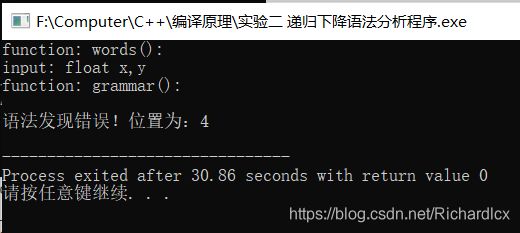
- 正确实例:q=520; 错误实例:q=520 错误实例:q=520;;



- 正确实例:while(r>=9){} 错误实例:while(r>=){}

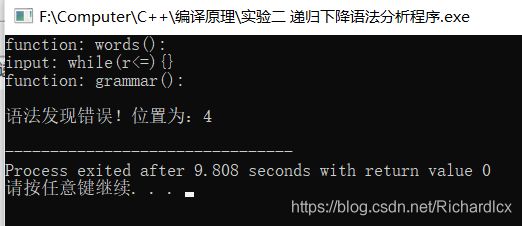
- 正确实例:if(l>c){x=6;} else{x=0;} 错误实例:if(x>y)z=t; else k=t;
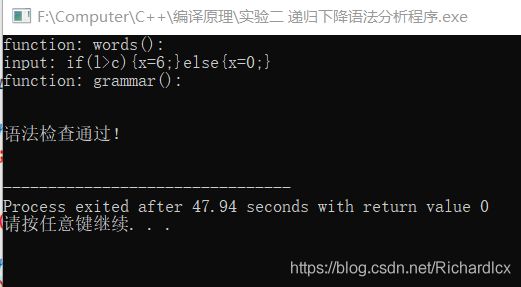

Notice:本程序内部分支多,且实验时间有限。要达到较为全面测试覆盖比较难,因此只要求变量定义语句、赋值语句、while、if四种语句均有正反测试用例。
六、配套资源
- 实验指导书
